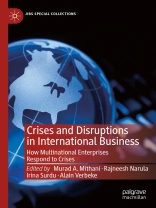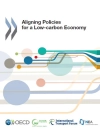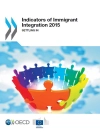Crises and disruptions can lead to important changes in economic, social and institutional environments. This collection of influential JIBS articles and original commentaries highlights that MNEs are affected by, and respond to, crises and disruptions differently than domestic firms due to their geographically dispersed operations and wider range of experiences from being active in diverse environments. MNEs can exhibit greater flexibility to ‘avoid’ locations characterised by crises and disruptions, and when affected, they can deploy a more refined set of responses relative to domestic firms.
Each article is accompanied by a brand new editorial piece, bringing the research right up to date and reflecting on the impact of the article today. In this way, the book offers an integrated perspective on the antecedents, outcomes and potential opportunities associated with a variety of crises and disruptions such as disease outbreaks, natural disasters, climate change and political unrest.
An ideal resource for students and researchers, this book offers new perspectives, policy and practical recommendations as well as a discussion of future trends. The volume concludes with a novel analysis on how businesses can move forward in a post-Covid world.
Inhoudsopgave
Part 1: Introduction.- 1. Unique Implications of Crises and Disruptions for International Business: How MNEs Are Exposed to Crises and Mitigate Their Effects.- Part-2: Multi-Stakeholder Pressures and Political Conflict.- 2. Speculation in International Crises: Report from the Gulf.- 3. Global Closure, Crises and Financial Markets: A Commentary.- 4. Why and How Might Firms Respond Strategically to Violent Conflict?.- 5. New ‘Dominant Logic’ on How Firms Respond to Crises: A Commentary.- 6. Why and How Might the Modern MNE Respond Strategically to Violent Conflict: A Commentary.- Part-3 Conflict Zones, Firm Strategy and MNE Performance Outcomes.- 7. Place, Space, and Geographical Exposure: Foreign Subsidiary Survival in Conflict Zones.- 8. Place and Space in Foreign Subsidiary Exit from Conflict Zones: A Commentary.- 9. Impact of Historical Conflict on FDI Location and Performance: Japanese Investment in China.- 10. Foreign Direct Investment and Military Conflicts: A Commentary.- Part-4 Climate Change, Climate Risk and MNE Strategy.- 11. A Perspective on Multinational Enterprises and Climate Change: Learning from ‘an Inconvenient Truth’?.- 12. International Business, Climate Change and the Energy Transition: A Commentary on the Importance of Business Models and Digitalization.- 13. The Impact of Climate Risk on Firm Performance and Financing Choices: An International Comparison.- 14. The Impact of Climate Risk on Firm Performance and Financing Choices: A Commentary.- Part-5 The Impact of Crises and Disruptions on Local Market Strategies and Legitimacy.- 15. Liability of Foreignness, Natural Disasters, and Corporate Philanthropy.- 16. Liability of Foreignness, Natural Disasters, and Corporate Philanthropy: A Commentary.- 17. International HRM Insights for Navigating the COVID-19 Pandemic: Implications for Future Research and Practice.- 18. The Impact of COVID-19 on International HRM Research and Practice: A Commentary.- Part-6 Conclusion.- 19. Moving Forward in a Post-Covid World.
Over de auteur
Murad Mithani is an Assistant Professor of Strategy and International Business at the School of Business, Rutgers University at Camden, New Jersey, US. His research focuses on the emergence of far-from-equilibrium behaviour in markets, in stakeholder relationships, and within organizations. Murad’s research has appeared and is forthcoming in
Journal of International Business Studies, Journal of Management, Leadership Quarterly, Academy of Management Perspectives, Long Range Planning, and Business & Society.
Rajneesh Narula is the John H. Dunning Chair of International Business Regulation at the Henley Business School, University of Reading, UK. His research and consulting have focused on the role of multinational firms in development, innovation and industrial policy, R&D alliances and outsourcing. He has published over a 100 articles and chapters in books on these themes. He is an Editor of the Journal of International Business Studies. He holds honorary appointments at United Nations University-MERIT, Norwegian School of Business, Oxford University and the University of Urbino.
Irina Surdu is an Associate Professor of International Business Strategy at Warwick Business School, University of Warwick, UK. Her research focuses on post-entry strategies of multinational firms, organisational learning and irresponsible MNE behavior. Her research has appeared in journals such as the Journal of International Business Studies, Journal of World Business, Journal of International Management, International Business Review and British Journal of Management and won awards at conferences such as AOM, AIB, BAM and EIBA. She is an Associate Editor of Multinational Business Review and a member of the Editorial Board of the Journal of International Business Studies.
Alain Verbeke is a Professor of International Business and holds the Mc Caig Chair in Management at the Haskayne School of Business, University of Calgary, Canada. He is also the Inaugural Alan M. Rugman Memorial Fellow at the Henley Business School, University of Reading, UK, an Adjunct Professor at the Solvay Business School, Vrije Universiteit Brussel, Belgium and the Editor-in-Chief of the Journal of International Business Studies.












